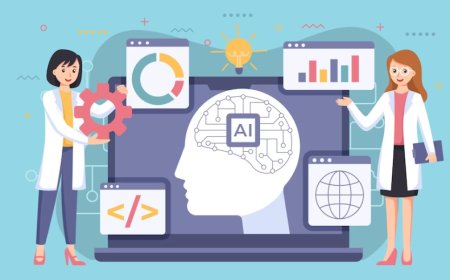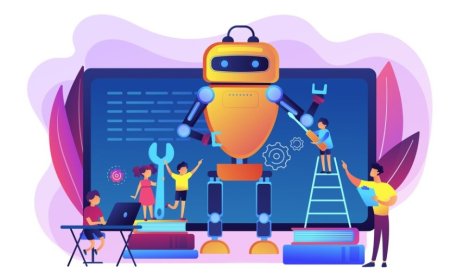The Crucial Importance of Machine Learning
Explore the pivotal role of machine learning in advancing technology and improving decision-making processes across various industries

Machine learning, a part of artificial intelligence, teaches computers to learn from data and make decisions without explicit programming. It's gaining popularity across the healthcare, finance, retail, and transportation industries because it can analyze large datasets, find patterns, and make accurate predictions. For example, in healthcare, it helps diagnose diseases and personalize treatments. In finance, it detects fraud and assists in trading decisions. In retail, it suggests products and manages inventory. In transportation, it optimizes routes and maintains vehicles. This trend reflects the growing importance of machine learning in improving processes, enhancing efficiency, and driving innovation across various sectors.

The importance and impact of machine learning in today's world are profound. It revolutionizes decision-making processes, enhances operational efficiency, drives innovation, and unlocks new opportunities for businesses and society. As machine learning continues to evolve and advance, its role in shaping the future of technology and human progress becomes increasingly significant.
What are the applications of machine learning?
Machine learning is used in many industries, like healthcare and finance. In healthcare, it helps doctors diagnose diseases by looking at patient data and images. It can also suggest personalized treatments based on each patient's needs. In finance, machine learning catches fraud by spotting unusual patterns in transactions. It also helps predict if someone is likely to pay back a loan or how the market might change. Overall, machine learning makes tasks easier and more accurate in different fields.
In marketing, machine learning helps sort customers into groups based on their behavior, likes, and who they are. This helps businesses send the right messages to each group. Also, it suggests products to customers based on what they bought before or looked at online. This makes marketing more personal and effective. Machine learning is handy in many industries because it solves tough problems and helps businesses come up with new ideas.
Benefits of Machine Learning
These benefits of machine learning contribute to optimizing business operations, reducing costs, and staying competitive in today's data-driven landscape.
-
Improved Decision-making: Machine learning analyzes large datasets to provide valuable insights, allowing businesses to make informed decisions based on data rather than intuition or guesswork.
-
Automation: By automating repetitive tasks such as data entry or customer support inquiries, machine learning frees up valuable time for employees to focus on more strategic and creative tasks, ultimately increasing overall efficiency.
-
Personalization: Machine learning algorithms analyze user behavior and preferences to deliver personalized experiences, such as customized product recommendations or targeted marketing campaigns, leading to higher customer satisfaction and engagement.
-
Enhanced Predictive Capabilities: Through the analysis of historical data and patterns, machine learning algorithms can make accurate predictions about future trends, market demand, or customer behavior, empowering businesses to plan and adapt their strategies accordingly for better outcomes.
How is machine learning important in everyday life?
Machine learning is a branch of artificial intelligence that involves developing algorithms and models that enable computers to learn from and make predictions or decisions based on data without being explicitly programmed to perform specific tasks. It occurs when computers learn from data and make judgments or predictions without being explicitly programmed. Netflix or Spotify, for example, will recommend movies or music based on what you have previously seen or listened to. Furthermore, virtual assistants like Alexa or Siri use machine learning to understand your voice commands and provide personalized assistance, such as setting reminders or playing music. It is similar to educating computers to become smarter and more useful in our everyday lives.
The primary impact is that technology has altered our daily lives, influencing how we shop online, communicate, and utilize media. While technology simplifies things, it also raises questions about privacy, data security, and job loss. It can also lead to filter bubbles, in which we only see information that confirms our preconceived notions, limiting our perspectives. So, while machine learning offers benefits, we must utilize it properly and ethically to ensure how well it serves society.
Educational and Career Opportunities
In today's job market, learning machine learning skills is crucial due to their widespread application across industries such as healthcare, finance, and technology. By acquiring these skills, individuals can enhance their job prospects and remain competitive in an evolving employment landscape. Various learning resources, including online courses and degree programs, offer comprehensive training in machine learning concepts and programming languages like Python, equipping learners with the necessary skills to succeed in the field.
There are some of the
-
Machine learning skills are essential for analyzing data and making predictions in industries like healthcare, finance, and technology.
-
Learning opportunities are available through online platforms like Coursera and Udemy, as well as formal degree programs at universities.
-
Career prospects for individuals with machine learning expertise are promising, with roles such as data scientist, machine learning engineer, and AI researcher offering competitive salaries and opportunities for advancement.
-
Additionally, individuals with machine learning skills can explore freelance or consulting opportunities to apply their expertise and drive innovation in various organizations.
Challenges and Limitations
Machine learning faces challenges like biases in algorithms and privacy worries due to the vast amount of personal data it collects. Biases can cause unfair treatment, like in hiring decisions, while privacy concerns arise from how data is used and who can access it. Technical hurdles include issues with data quality and understanding how machine learning models make decisions. Poor-quality data can lead to mistakes, and it's important to know how models reach their conclusions for transparency. Despite its usefulness, machine learning has limits, especially when data is scarce or tasks require common sense reasoning, highlighting areas for further improvement.
Future Trends in Machine Learning
Future trends in machine learning include techniques like deep learning, where computers learn from lots of data to understand complex patterns, and reinforcement learning, which helps them make better decisions over time by learning from feedback. In the future, these techniques could lead to exciting advancements in areas like healthcare, where computers could personalize treatments for patients based on their unique needs, or transportation, where self-driving cars could become safer and more efficient. Machine learning could also help in finance by making better predictions about risks and in cybersecurity by detecting threats more effectively. Overall, the future of machine learning looks promising for making our lives easier and safer in many different ways.
Machine learning is important in many areas, like healthcare, finance, and technology, because it helps make decisions and automate tasks using data. It's valuable for personal and professional growth because it opens up job opportunities and keeps us competitive in a changing job market. Learning machine learning skills allows us to solve problems better, adapt to new job demands, and contribute to making technology and society better. In today's world, embracing machine learning isn't just helpful, it's essential for staying up-to-date and making a difference in different industries.




































